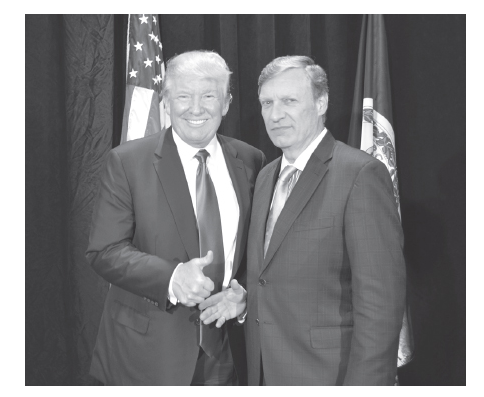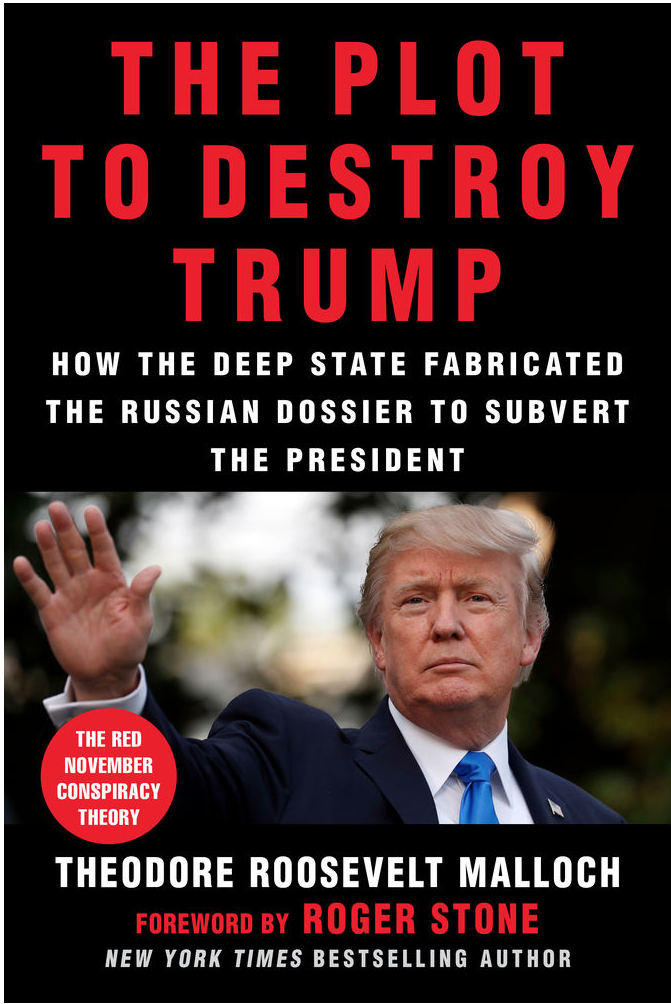When Roger Stone wanted to reach Julian Assange, he allegedly tried to go through one particular London contact: a far-right American writer named Ted Malloch with a history of embellishments and a career that took him from the United Nations to Infowars to the fringes of Trumpworld.
Since President Trump’s election, Malloch has popped up at strange points in the administration’s brief history. First, he floated himself as a pro-Brexit U.S. ambassador to the European Union, before that was shot down, and he was later intercepted by FBI agents at Boston Logan airport to be interviewed as part of special counsel Robert Mueller’s probe.
A draft of a plea agreement between Mueller and Jerome Corsi alleged that Corsi forwarded Malloch a July 25 email from Stone saying “Get to [Assange] [a]t Ecuadorian Embassy in London and get the pending [Wikileaks] emails … they deal with Foundation, allegedly.” Mueller is also reportedly investigating whether Malloch’s appearances on RT were coordinated with Russia.
Corsi, a conspiracy theorist who is famous for his unreliability and who filed a federal lawsuit against Mueller over the weekend, provides most of the information on Malloch’s role through his release of the draft plea agreement, so there is reason to be wary about Malloch’s exact involvement, if any, in connecting Corsi and Stone to Wikileaks.
But a look at the 66-year old and interviews with those who have known him show a bizarre journey for Stone’s London fixer that appears to have taken him from the Christian right through a Connecticut bankruptcy to becoming an early public supporter of the Trump campaign.
Who is Ted Malloch?
‘Globalist’ Turned Trumper
Malloch has an intriguing background that at a glance has an air of legitimacy. He went from the Reagan-era State Department to a position at the World Economic Forum in Davos, describing the journey in his memoirs. But a closer examination reveals a history of exaggerations and embellishments, with various people and organizations that he’s claimed to have interacted with denying any association.

He’s also a prolific writer, penning an autobiography called “Davos, Aspen, And Yale: My Life Behind The Elite Curtain As A Global Sherpa” and another called “The Plot To Destroy Trump: How The Deep State Fabricated The Russian Dossier To Subvert The President.”
To use Corsi’s own conspiracy-mongering words, Malloch “is a guy who’s had really high positions as a globalist.”
But to one acquaintance of Malloch’s, “Ted did not strike me as a con artist nearly as much as he struck me as a guy who had been around a couple of important people.”
“I think he is surprised that he isn’t as big a deal as he thought he was,” the acquaintance added.
Corsi, a conspiracy theorist with a history of fabrications designed to drive news cycles, told TPM a bizarre story in which he claimed to have met Malloch in 2015, while investigating a PwC audit of the Clinton Foundation.
“[Malloch] had been running a series of CEO conferences for several years for PwC’s chairman. It was a courtesy, if I’m going to write adversely about PwC I wanted to give them a heads up before I did it,” Corsi said.
“And Ted said, ‘I’ve got this memoir I’m trying to get published, it would be a good memoir for World Net Daily books,'” Corsi recalled.
When TPM asked about the conference series, a PwC spokeswoman said that the company couldn’t confirm any relationship with Malloch, adding “no one knows where this came from.”
Corsi told TPM that he introduced Malloch to Roger Stone in March 2016 in New York City.
“In 2016, Malloch wanted to play a policy role with Trump’s campaign, as I recall, and I introduced Malloch to Stone to see if Stone could introduce Malloch to the Trump campaign and maybe help them with policy papers,” Corsi recalled.
The two apparently hit it off, because, according to Corsi, Stone issued Malloch two other tasks in addition to contacting Wikileaks in July 2016: contacting Bernie Sanders’s UK-resident brother to determine if there was a rift in their relationship, and “to find out any dirt” on whether Bill Clinton was expelled from the Rhodes Scholar program at Oxford University.
Corsi added that Malloch only succeeded in contacting the Oxford University “archivist” with an inquiry into any “dirt” on Bill Clinton.

“He’s a brilliant scholar, but he’s not a gumshoe,” Corsi explained. The Oxford University archivist declined to comment. Larry Sanders did not reply to a request for comment.
“No comment,” Malloch told TPM.
Stone told TPM that he would “only respond to legitimate media organizations, not crazy left-wing propaganda fronts that no one of any consequence reads.”
Bankruptcy And Alleged Financial Misdeeds
While Malloch was fielding emails from Stone and Corsi in the summer of 2016, he may have had another reason for being in London: escaping jurisdiction on a disastrous personal bankruptcy case that had bogged him down in Connecticut.
After Malloch declared bankruptcy in November 2013, two banks accused him of fraud in filings in the case in early 2014.
“There was certainly concern at the time that he may never return to the U.S.,” recalled Michael Kopsick, a special counsel appointed to handle the case who had also worked on a separate bank lawsuit against Malloch in Arkansas involving a $3.5 million Florida mansion.
In both the Arkansas and Connecticut cases, banks accused Malloch of misstating his net worth to obtain loans. According to an FT report on the matter, his self-declared wealth went from $36.3 million in 2003 to $152,000 in 2013, at the time of his bankruptcy.
In the Connecticut case, the trustee actually accused Malloch of lying early on in the bankruptcy, by allegedly claiming he was renting a $547,000 Connecticut house. But the trustee would discover, according to the court filings, that the house was in fact owned through a foundation Malloch controlled called the Spiritual Enterprise Initiative.
The trustee alleged that the foundation sold the home in the interim and transferred the proceeds to a German bank account whose beneficiary was the “Theodore Malloch Jr. Spiritual Enterprise Institute.” The move allowed Malloch to allegedly conceal from the trustee a sizable asset that would otherwise have been available to pay creditors. Kopsick, who was brought on by the trustee to track down the sale proceeds, told TPM that any further searching would be pointless since “it’s buried so deep nobody is ever gonna find it.”
“Despite years of investigation and review, neither the Trustee nor the Estate’s Special Counsel have been able to locate or trace the origins and and subsequent transfers and disposition” of the proceeds of the house sale, the trustee wrote in a settlement filing in the case.
Malloch eventually paid $75,000 to settle the case in an agreement that Kopsick said the trustee accepted in part because “people just gave up.”
“He presented as though he was jetting off to Aspen and various places in Europe to consult with the high and mighty in the financial and political world, but if you looked a little deeper behind that, it never seems that it all bore out to be true,” Kopsick added.
The settlement filing states that the trustee ended the matter in part because of Malloch’s age and because “shortly after their Chapter 7 filing, the Debtors took up residence, and continue to reside, outside of the United States.”
“We tried like hell to get the U.S. Trustee’s office to refer the matter for criminal prosecution,” Kopsick said. “For the life of me, I cannot understand what type of behavior by a bankrupt debtor is bad enough for them to actually do something. If this isn’t a poster child for the type of behavior you’re trying to deter, I don’t know what is.”
Malloch told FT that he was never “convicted or tried for any fraudulent activities.”
The Alleged Wikileaks Connection
Much of the key action in the bankruptcy case occurred during the summer of 2016, when the self-described “global sherpa” Malloch was allegedly engaging in communications with Jerome Corsi that have now attracted Mueller’s interest.
Corsi forwarded an email from Roger Stone on July 25 to Malloch, telling him to “Get to [Assange],” according to the draft plea agreement that Corsi released.
On July 31, 2016, Stone emailed Corsi, saying that “Malloch should see Assange.”
Corsi replied the next day with eerily accurate information about Wikileaks’ plans: “Word is friend in embassy plans 2 more dumps. One shortly after I’m back. 2nd in Oct. Impact planned to be very damaging…”
Days later, Stone boasted in an Aug. 4 email to Trump political consultant Sam Nunberg that, “I dined with my new pal Julian Assange last nite.” (Stone later said he was baiting Nunberg with “a shtick.”)
It remains unclear if Malloch succeeded in establishing contact with Wikileaks and Assange. Corsi told TPM that Malloch had “failed,” and Malloch has also denied traveling to the embassy.
Corsi told TPM that he had testified to the Mueller grand jury that Stone called him on Oct. 7, the day that the Washington Post published the Access Hollywood tape. Corsi recalled that Stone claimed to have advance knowledge of the “Billy Bush tape” and that the GOP operative told him, “if you have any way to get to Assange to start dropping, tell him to start dumping.”
Corsi said that after speaking with Stone in the morning, he had two conference calls: one with the staff of conspiracy news site World Net Daily, and another with “a group called Total Banking Systems.” TPM was unable to locate such a group.
“Ted Malloch was on the call,” Corsi said about the Total Banking Systems interaction, adding that he himself had likely mentioned Stone’s Wikileaks request to Malloch.
Thanks to his brush with Corsi, FBI agents intercepted Malloch at Boston Logan airport in March 2018. Investigators reportedly asked him about his contacts with Stone and whether he had ever visited the Ecuadorian Embassy in London, where Wikileaks founder Julian Assange continues to reside.
In a statement at the time issued to Alex Jones of Infowars, where Malloch was an occasional contributor, Malloch said that the FBI agents “seemed to know everything about me” and added that he had been warned that lying to federal investigators is a felony. The episode prompted an emergency broadcast from Jones.
Malloch added in the statement that he had met Stone a total of three times, and that FBI agents had seized his cell phone. “I was unfazed and very dubious of why they thought I knew anything,” Malloch said in the statement.
Malloch’s role in the Mueller probe remains potentially central to allegations that Stone may have served as a conduit between the Trump campaign and Wikileaks.
A History Of Embellishments and Exaggerations
In his autobiography “Davos, Aspen, and Yale,” which was picked apart by FT, Malloch describes his journey from “the very essence of Old Philadelphia” to Infowars.
The memoir opens with a revealing chapter called “The Greatest Race,” in which he ostensibly describes a crew regatta in which his son (a Yale graduate) competed, but which is drenched with references to racial purity.

“Here we have the mingled bloodlines of the Saxons, the Angles, the Jutes, the Picts, the Normans, the Frisians, the Danes, and all the other palefaces of Europe, engaged in their original sport,” Malloch wrote, before ending the chapter by recounting his son’s victory in the regatta against Oxford.
“The bloodline is secure,” Malloch concluded the chapter, after watching his son defeat rowers from Oxford Brookes University, a British institution unaffiliated with Oxford (though Malloch does repeatedly refer to the team as “Oxford.”)
The book goes on to chronicle Malloch’s childhood in a Philadelphia “that doesn’t exist anymore, the Philadelphia of manners, enunciation, tradition, and a belief that arts and culture are contained between the Schuylkill and the Delaware, concentrating especially around the Walnut Street Theatre and the Philadelphia Museum of Art, with after-parties at the venerable Philadelphia Club.” Malloch uses the word “WASP” at least 50 times in the book.
“My parents eventually feared the inner city that had nurtured us, and we fled for the lily-white suburbs, the aforementioned Main Line,” he added, before mentioning his “Catholic” and “Jewish” friends who stayed behind and died early.
Malloch ends up at the University of Toronto, where he writes that he graduated in 1979. “I finished my entire doctoral program in an unprecedented less than three years.” A university spokesman told TPM that Malloch graduated in 1980.
From there, Malloch went to Washington, joining the State Department in the mid-1980s. In his memoir, Malloch writes of joining “The Fellowship” while working at the State Department and going to National Prayer Breakfast meetings.
He writes of traveling to see the “legendary general” Angolan rebel leader Jonas Savimbi on a “clandestine mission.” Both Paul Manafort and Jack Abramoff were representing Savimbi in Washington at the time.
Malloch’s diplomatic career appears to have peaked as deputy to the executive secretary at the UN Economic Commission for Europe in Geneva, a role he calls “ambassadorial-level” but which FT reported as an exaggeration.
Paul Dietrich, an investment banker cited in the memoir as investing with Malloch, told TPM “that’s definitely not true.”
As the years wore on, Malloch appears to have struck up a relationship with the right-wing John Templeton Foundation, receiving a grant to publish a book about thrift with the group in the mid-2000s.
In 2005, the non-profit that Malloch would later use in his bankruptcy — the Spiritual Enterprise Initiative — was also founded.
Alfred Regnery, a one-time Reagan anti-porn official and former Corsi publisher listed as a director of the group, told TPM, “I am not on that board.” When shown a corporate registry filing with his name on the board of the organization, he said. “I have no recollection of that,” and added that Malloch may have signed him up without his knowledge.
“He had a lot of contacts with [the Templeton Foundation],” Regnery added.
Malloch’s relationship with Templeton propelled him to Yale in 2010, when the university took $1.875 million from Templeton to create the Spiritual Capital Initiative at the Yale Divinity School.
Malloch derived immense credibility from his time at Yale. When he began publicly supporting the Trump campaign, insiders saw him as useful in part because of his supposedly rare status as a conservative academic, while many others cited his time at Yale as an impressive qualification.
The reality is more complicated.

Malloch appears to have been attached to the Templeton money. Yale and Divinity School faculty would not comment on whether the foundation had any influence over Malloch’s appointment, apart from confirming that Malloch was a senior research scholar there from January 2010 to July 2013, which differs from Malloch’s own rendering of his role as a “research professor.”
Both Yale and Templeton have since scrubbed any reference to the Spiritual Capital Initiative from their websites. Archived posts show the group writing case studies of companies that exemplify “spiritual capital,” ranging from Chick-Fil-A to the Guanghzhou Eversunny Trading Company. Yale would not comment on whether donor relationships affected the Spiritual Capital Initiative’s content.
A film called “Doing Virtuous Business” that Malloch produced for PBS claimed support from Templeton as well the religion-focused Lilly Endowment.
The Templeton Foundation did not reply to repeated requests for comment. The Lilly Endowment told TPM that it could find no record of any support for Malloch.
After the 2016 election, Malloch — who has compared the European Union to the Soviet Union — began touting himself as Trump’s pick for U.S. ambassador to the EU, in part by using his Yale credentials to boost himself.
Even though rumors about Malloch’s appointment were contained to Malloch, the prospect of his appointment caused enough shock in Brussels for European diplomats to raise the issue during visits to Washington.
Malloch’s would-be candidacy went down in flames, however, after an FT investigation found that he had embellished his resume, and that his ties to Oxford and the World Economic Forum were far more tenuous than he had made them appear.
After the FT report, Malloch launched a campaign in the right-wing media, calling the report an attempt at “political assassination.”
“I seem to have made myself very unpopular with the European Union (EU) and its media friends or are they cronies?” Malloch wrote in a Breitbart column.
“The EU does not want any one but a pro-EU, US ambassador to go to Brussels,” Malloch added.
Malloch appears to have parlayed that experience into a regular column at Breitbart, penning classics like “Europe, Eurabia, and the Last Man,” and “£60bn Brexit Bill? Just Give Every Brit £923.076 Instead…”
It’s not clear how Malloch’s role in the Mueller investigation will end.
In his memoir, Malloch claims that “the KGB” attempted on multiple occasions to flip him while he was working at the World Economic Forum. He describes several trips he took to Moscow in 1990 to help bring the changing country’s leaders to Davos. Besides alleging Babylonian levels of debauchery and Russian spying attempts, he claims to have worked closely with a top WEF official named Maria Livanos Cattaui.
Cattaui told TPM she barely remembered Malloch.
“He must not have been very important,” she added.






